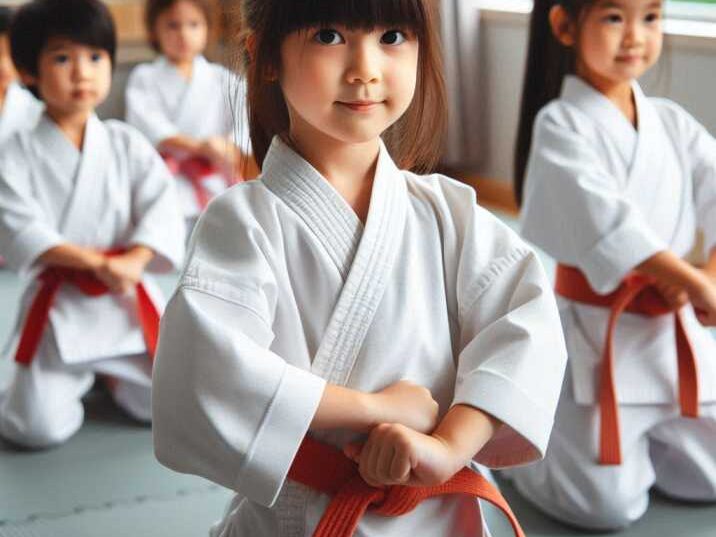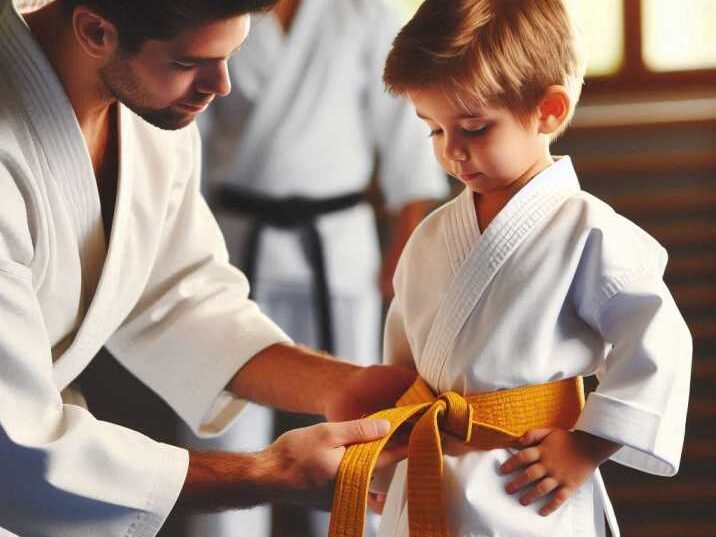Introduction
Table of Contents
Karate is often associated with older kids and adults, but it’s also a fantastic activity for young children, including karate for 3-year-olds. Introducing your child to karate at a young age can help them develop essential skills like discipline, focus, and self-control. In this article, we’ll explore the benefits of karate for 3-year-olds, how it helps in physical and mental development, and why it might be the perfect extracurricular activity for your little one.

1. Why Karate for 3-Year-Olds?
Karate is a martial art that emphasizes discipline, focus, and respect. For young children, especially those around the age of 3, these qualities are particularly beneficial as they are just beginning to develop critical foundational skills. At this age, children are still refining their gross motor skills and coordination, which are crucial for their overall development. Karate provides a structured environment where young children can improve these skills in a fun, engaging, and supportive way. Through basic karate exercises and movements, children learn to control their bodies better, enhancing their physical development while also learning important values such as discipline and focus.
2. Physical Benefits of Karate for Young Kids
Karate is more than just a series of kicks and punches; it encompasses a range of movements that significantly benefit young children physically. Karate for 3-year-olds, these activities can enhance their motor skills and help them build strong muscles and bones. Karate training involves exercises that promote balance, strength, and flexibility, which are all vital for a child’s physical development. These physical benefits help young children develop a healthy lifestyle from an early age, laying the groundwork for lifelong fitness and well-being.
2.1 Improved Balance and Coordination
Young children often struggle with balance and coordination as they are still developing their gross motor skills. Karate helps improve these skills by teaching children how to control their bodies through various movements and stances. The repetitive practice of karate moves, such as blocking, kicking, and punching, requires children to focus on their body position and movement, enhancing their ability to balance and perform tasks with precision. This foundation is beneficial not only in karate but also in other physical activities and sports that children might pursue in the future.
2.2 Building Strength and Flexibility
Karate exercises involve a wide range of movements that help build strength in the legs, arms, and core. These exercises require children to use their muscles in ways that help develop overall body strength. Additionally, karate includes stretching exercises that promote flexibility, an important aspect for preventing injuries and supporting overall growth. Flexibility exercises help children improve their range of motion, which is crucial for performing karate moves correctly and safely. The combination of strength-building and flexibility exercises makes an excellent physical activity of karate for young children.
3. Mental Benefits: Developing Focus and Discipline
One of the most significant benefits of karate for young children is the development of mental skills such as focus, discipline, and concentration. Karate training requires children to pay close attention, follow instructions, and stay disciplined throughout the session. This kind of structured training helps improve children’s ability to concentrate and stay focused, which can translate to better performance in school and other activities.
3.1 Enhancing Focus and Attention
Karate requires kids to listen carefully and follow instructions from their instructors. This process helps enhance their attention span and ability to concentrate on tasks for longer periods. By engaging in activities that require focus, children learn how to stay attentive and disciplined, skills that are valuable both in and out of the dojo. These mental skills are especially useful in academic settings, where children are required to pay attention and follow instructions to succeed.
3.2 Instilling Discipline and Self-Control
Karate promotes a structured environment where children learn the importance of following rules, taking turns, and respecting their peers and instructors. This discipline extends beyond the dojo, helping them manage their behavior and actions in various settings. Through karate, children learn self-control and how to handle challenging situations calmly and respectfully, skills that are essential for personal growth and development.
4. Social Benefits: Building Confidence and Social Skills
Karate classes provide a unique environment where children can interact with their peers and develop social skills. Karate for 3-year-olds, this can be a fantastic opportunity to learn about sharing, cooperation, and respecting others. Through group activities and paired exercises, children learn how to work together, communicate effectively, and build relationships with others.
4.1 Boosting Confidence and Self-Esteem
Achieving new skills and earning belts in karate can significantly boost a child’s self-esteem and confidence. The sense of accomplishment that comes from mastering a new move or earning a new belt encourages children to set goals and work hard to achieve them. This process helps instill a positive mindset and a sense of pride in their abilities from a young age, which can be incredibly beneficial as they grow older and face new challenges.
4.2 Encouraging Teamwork and Respect
In karate, children often work in pairs or groups, which teaches them the importance of teamwork and cooperation. They learn to communicate effectively with their peers, support each other, and work together to achieve common goals. This fosters a sense of community and belonging, helping children feel more connected to others. Additionally, karate teaches children to respect their peers and instructors, promoting a positive social environment where everyone feels valued and supported.

5. Is Karate Safe for 3-Year-Olds?
Many parents have concerns about the safety of martial arts, especially for very young children. However, karate for 3-year-olds is generally considered safe because the classes are designed specifically for their age group. At this stage, karate is primarily about learning the basics, developing coordination, and having fun. The emphasis is on creating a safe and supportive environment where children can learn without any risk of injury. Let’s look at some reasons why karate can be safe for 3-year-olds.
5.1 Non-Contact Training
For 3-year-olds, karate classes focus on non-contact training. This means that the children are not involved in any sparring or direct physical contact with each other. Instead, the classes are designed to teach basic movements and positions, such as blocking, kicking, and punching, in a controlled and safe manner. The goal is to help young children develop motor skills, balance, and coordination while learning the fundamental movements of karate. Non-contact training ensures that there is no risk of injury from hitting or getting hit, which is especially important for this age group. The focus is on helping children learn proper techniques and body control, laying a foundation for more advanced training as they grow older.
5.2 Emphasis on Fun and Learning
Karate classes for 3-year-olds are designed to be engaging and enjoyable. The instructors use games and fun activities to introduce the basics of karate, which helps keep the children interested and motivated. By incorporating play into the lessons, children can learn essential skills without feeling like they are in a rigid or demanding environment. The emphasis is on fun, movement, and participation, making it an exciting and positive experience for the children. This approach helps build confidence and a love for physical activity, which can encourage them to continue practicing martial arts as they grow older. Moreover, by making the learning process enjoyable, children are more likely to remember what they have learned and develop a positive attitude toward karate and physical fitness.
6. Choosing the Right Karate Class for Your Child
Selecting the right karate class for your 3-year-old is crucial to ensuring they have a positive and safe experience. Here are some key factors to consider when making your decision:
Class Size: Smaller Class Sizes Ensure More Individual Attention
When looking for a karate class, it’s essential to consider the class size. Smaller class sizes are better for young children because they allow the instructor to give more individual attention to each child. This means that your 3-year-old will receive more personalized guidance and support, helping them to learn the correct techniques and movements more effectively. With fewer students in the class, the instructor can also closely monitor each child’s progress and ensure that they are safe and engaged during the lesson. This can make the learning process more enjoyable and effective for young children.
Instructor Experience: Look for Instructors with Experience in Teaching Young Children
The experience and qualifications of the instructor are critical when choosing a karate class for your child. Instructors who have experience working with young children understand the unique needs and learning styles of this age group. They know how to make the classes fun and engaging, using games and activities that keep 3-year-olds interested and motivated. Experienced instructors are also skilled in managing young children’s behavior and can create a positive, supportive environment where kids feel comfortable and encouraged to try new things. They are adept at balancing discipline with fun, ensuring that the children learn important karate skills while also enjoying the process.
Safety Protocols: Ensure the Dojo Has Proper Safety Measures in Place
Safety is a top priority, especially when it comes to young children participating in physical activities. Make sure the dojo has proper safety measures in place to protect your child. This includes having well-maintained mats to prevent injuries from falls, safety equipment if needed, and clear guidelines on safe behavior during class. The dojo should also have first aid supplies readily available and instructors who are trained in basic first aid and CPR. Additionally, the environment should be child-friendly, with no sharp edges or hazardous objects that could pose a danger to the children. By choosing a dojo with robust safety protocols, you can ensure that your child can enjoy learning karate in a secure and controlled setting.
Table of Information: Benefits of Karate for 3-Year-Olds
| Benefit | Description |
|---|---|
| Physical Fitness | Improves strength, balance, and coordination. |
| Discipline | Encourages following rules and structured routines. |
| Focus and Concentration | Enhances attention span and ability to concentrate on tasks. |
| Social Skills | Promotes teamwork, communication, and respect for others. |
| Self-Control | Teaches children to manage their impulses and emotions. |
| Confidence | Builds self-esteem through achievement and mastery of skills. |
| Fun and Enjoyment | Provides a fun, engaging way to stay active and develop healthy habits. |
7. Conclusion: Karate as a Path to Growth and Development
Karate offers numerous benefits for young children, from improving physical fitness to enhancing mental focus and social skills. It provides a fun, structured environment where children can develop valuable life skills that will serve them well into adulthood. By enrolling your 3-year-old in karate, you’re not just signing them up for a sport; you’re giving them tools for lifelong success.
FAQs About Karate for 3-Year-Olds
- Is karate suitable for 3-year-olds?
Yes, karate is suitable for 3-year-olds as it focuses on basic movements and discipline without any physical contact. - What are the benefits of karate for young children?
Karate helps in developing physical fitness, discipline, focus, and social skills in young children. - How do I find a good karate class for my 3-year-old?
Look for classes with experienced instructors, small class sizes, and a focus on safety and fun. - Is karate safe for toddlers?
Yes, karate is safe for toddlers when taught by trained instructors and focuses on non-contact exercises. - What should my child wear to karate class?
Children should wear comfortable clothing, such as a karate uniform (gi) or loose-fitting clothes, suitable for movement.


